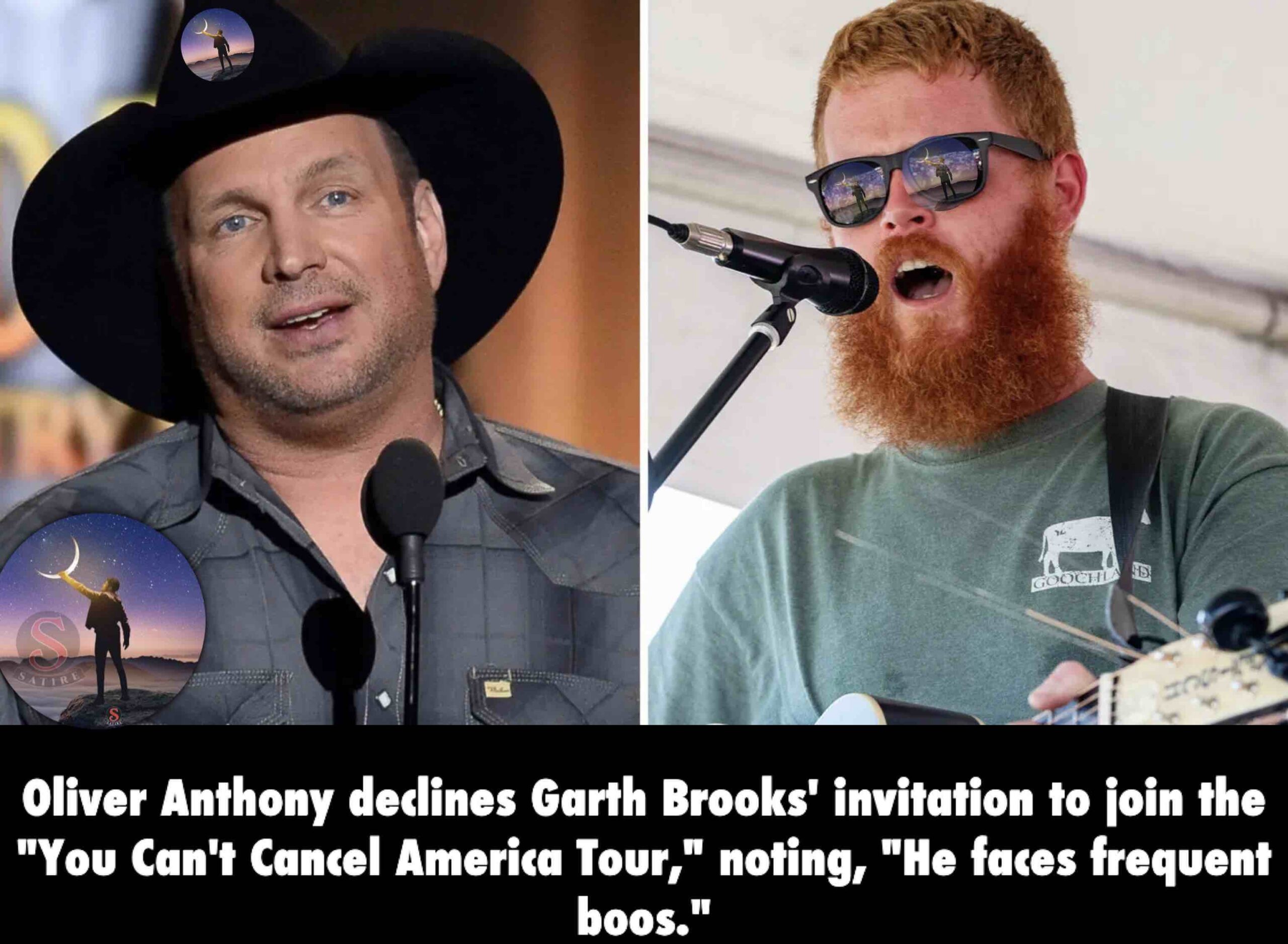In a surprising turn of events that has reverberated through the country music industry, rising star Oliver Anthony has declined a $5 million offer from Garth Brooks to join him on his “Can’t Cancel America Tour.” Anthony’s decision, accompanied by the candid remark, “He gets booed a lot,” unveils a complex interplay of artistry, public perception, and the turbulent socio-political landscape influencing the music world.
The “Can’t Cancel America Tour,” envisioned by Garth Brooks, a titan in the country music scene, aimed to make a bold statement in today’s politically charged environment, transcending current divides and uniting fans through the power of music. The inclusion of Oliver Anthony was intended to bridge generations, combining Brooks’ legendary status with Anthony’s fresh and evolving sound.
However, Anthony’s rejection of the $5 million offer goes beyond a significant financial decision; it serves as a profound statement about his stance and understanding of the current cultural milieu. His justification, “He gets booed a lot,” succinctly captures the predicament many artists face in an era where political and social opinions are deeply polarizing, even within the realms of music and entertainment.
Garth Brooks, known for attempting to remain apolitically neutral, has inadvertently found himself entangled in the political divide, impacting his once-universal appeal. His decision to perform at President Biden’s inauguration, though seemingly innocuous, was interpreted by some as a political endorsement, leading to a backlash from a section of his fan base. This incident reflects the broader challenges artists face in maintaining a non-partisan public image in a highly politicized environment.
For Oliver Anthony, an emerging artist with a growing fan base and a distinct musical style, aligning with Brooks at this juncture posed a significant risk. Anthony’s decision to decline the offer goes beyond financial implications; it mirrors his acute awareness of the importance of aligning his brand with figures who resonate with his and his fans’ values and beliefs. His remark about Brooks getting “booed a lot” sheds light on his apprehension about potentially alienating his audience or getting caught in the crossfire of the cultural and political divide that has permeated the country music landscape.
Anthony’s move is a testament to the changing dynamics in the music industry, where artists are increasingly mindful of how their collaborations and associations might be perceived. In an era dominated by social media and instant news, every decision an artist makes can have far-reaching implications on their career and public image.
For upcoming artists, Anthony’s decision serves as an important lesson in navigating their careers with a careful balance of artistic integrity and market realities. It underscores the need to be attuned not just to potential financial gains but also to the broader socio-political context in which they operate.
Anthony’s refusal to join Brooks’ tour could potentially signal a shift in how collaborations are viewed in the music industry, particularly in genres deeply intertwined with cultural and political identities like country music. Traditionally, musical collaborations have been about harmonizing different sounds and styles. However, in today’s context, these partnerships are increasingly scrutinized through the lens of shared values and public perception.
For Garth Brooks, this incident could lead to a reevaluation of how he approaches future collaborations, especially with artists who, like Anthony, are acutely aware of and responsive to their audience’s sentiments and the broader socio-political environment.
The incident brings into sharp focus the challenges artists face in navigating the socio-political divide in America today. Country music, once known for its wide appeal and ability to transcend socio-political barriers, now finds itself at the heart of these divides. Artists are compelled to tread a fine line, balancing their personal beliefs, artistic expression, and the expectations of a diverse and increasingly polarized fan base.
Oliver Anthony’s decision to turn down the $5 million offer from Garth Brooks is more than just a personal career choice; it is indicative of a larger trend in the music industry. It highlights the growing importance of socio-political awareness among artists and the need for a nuanced understanding of how their decisions resonate with their audience. As the country music scene, and the entertainment industry at large, continues to navigate its place within the broader cultural and political landscape of America, the actions and choices of artists like Oliver Anthony will play a pivotal role in shaping its future trajectory.


